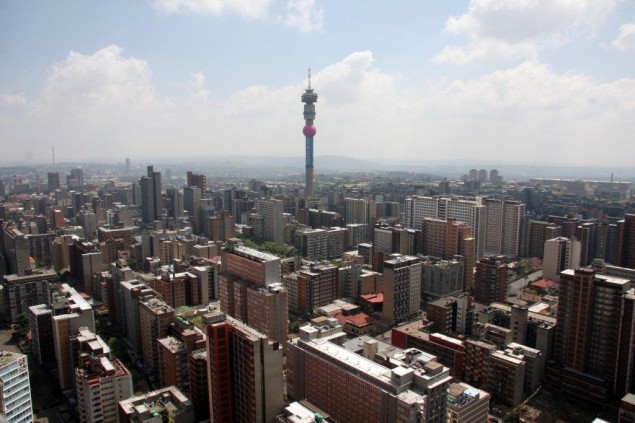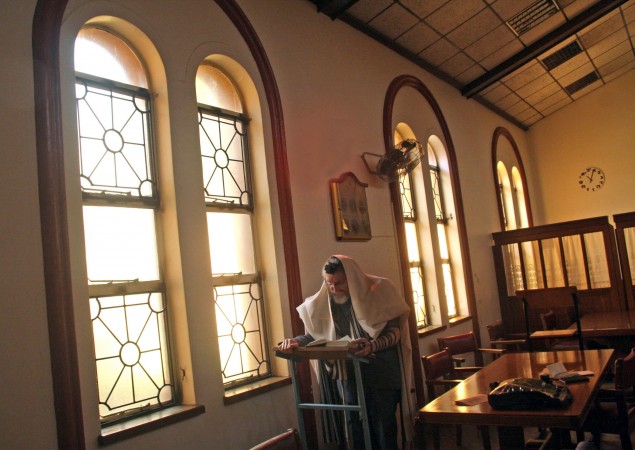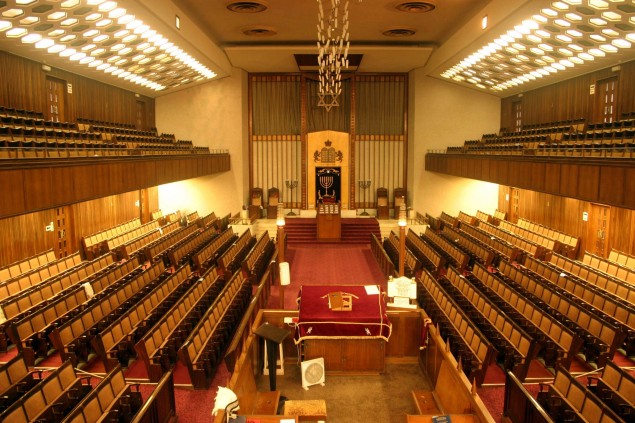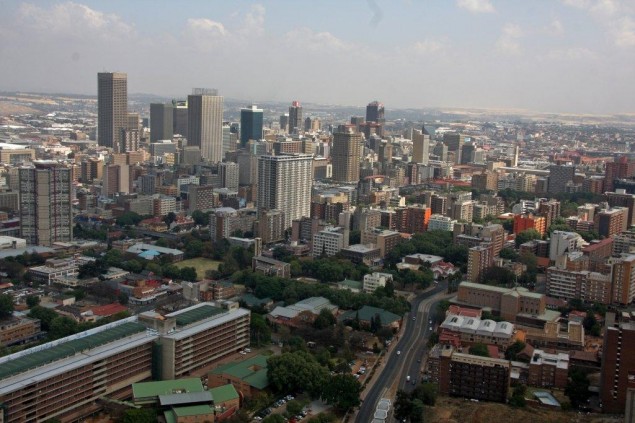JOHANNESBURG — Shortly before I began a visit to South Africa late last year, my first time in the once-reviled nation that had emerged from the darkness of apartheid sixteen years earlier, I noticed an interesting online article datelined Johannesburg. A new eruv was being built, and there was opposition from some Johannesburg residents.
Old stuff, I thought. In the United States, the erection of new eruvim often draws opposition, usually from civil libertarians who claim that eruv poles—traditionally affixed atop existing utility poles—are a violation of constitutionally protected separation of church and state. Usually the opponents are non-Jews who fear an influx of Jews. Or non-Orthodox Jews who talk publicly about law but, we suspect, talk among themselves about too many of “those Jews,” the ones with beards and black hats, long dresses and baby carriages, moving into areas where an eruv serves as a tacit invitation.
Here, it was neither.
The opposition in Johannesburg, I discovered when I kept reading, was something new.
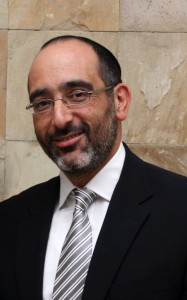
Forty-year-old Chief Rabbi Warren Goldstein, who took office eight years ago, is the country’s first South African-born chief rabbi.
The under construction eruv of the Greenside Hebrew Congregation, the latest eruv in the city that has an estimated Jewish population of 55,000, was raising security fears.
The “New South Africa”
A 1990s spike in the crime rate in what everyone here calls the “new South Africa” was an unfortunate byproduct of the new freedom and unfulfilled economic expectations. Home robberies and car-hijackings became especially common, and streets in upscale neighborhoods were deserted after dark.
Although the worst days of street crime—or fear of street crime—have passed, safety is still a concern of residents and visitors. From the start of this decade until 2010, the last year for which official statistics are available, the murder rate per 100,000 residents in South Africa fell from 59 to 34.1 percent; the murder rate during that period in the US decreased from 6 to 4.8 percent. Every home I saw in Johannesburg and Cape Town was surrounded by a barbed-wire-topped security fence; “armed response” firms with macho names like Stallion and Champion earn big bucks (or in the case here, big rands) to protect frightened citizens and their property.
Enter the eruv.
Residents feared that criminals would scale the eruv poles to climb over the electric security fences, Johannesburg newspapers reported. “Criminals will work out in less then two seconds how to scale this pole and jump over the electric fences into properties,” one woman was quoted as saying. “Obviously, no thought was given to security.”
“Resistance to the project . . . has taken a uniquely South African twist,” the European Jewish press reported.
Exactly my thoughts.
The eruv controversy—which ended when the eruv builders agreed to put barbed wire at the top of poles bordering on people’s property—epitomizes Jewish life here. It reflects the growth of a mitzvah-observant community that requires another eruv, the concern over security that does not factor into eruv opposition elsewhere, and the non-confrontational way the matter was settled.
Although South Africa, with an estimated Jewish population of 70,000—down from the 1970s high point of 120,000—has no more Jews than a mid-sized Jewish community in the US or a single Jewish neighborhood in New York City, its Jewish community plays a larger role on the world stage. Jews, frequently ones with negligible ties to the Jewish community or to Jewish tradition, played a disproportionate role in the white opposition to the racist regime, and Jews of all stripes today are involved in rebuilding the interracial society.
The Fashionable Ba’al Teshuvah
South Africa, like other countries that are or were part of the British Empire, puts a premium on civility and tradition, and, combined with the Ubuntu community-first ethos of black South Africans that permeates the land, has produced a unique Jewish community.
• A Jewish community whose public face is Orthodox, while many of its members’ private practice is not.
• A Jewish community where all the food served at public events, no matter the affiliation of the sponsoring organization, is kosher.
• A Jewish community that exhibits little of the internecine warfare that is familiar in the US.
• A Jewish community that has a significant population of ba’alei teshuvah.
Some 80 percent of South Africa’s Orthodox community has ba’al teshuvah roots.
The ba’al teshuvah movement that helped spur the revival of Orthodox life in the States, starting in the late 1960s and early ‘70s, came here a decade later but continues to have a major impact. With the help of Chabad, Aish HaTorah and Ohr Somayach, chinuch, kashrut and synagogue attendance are flourishing.
“Look around,” my host in Johannesburg advised me erev Shabbat in his crowded Orthodox shul. The seats were filled with several dozen men. “Besides the rabbi and the man at the amud,” my American-born host said, “there’s not a person here who isn’t a ba’al teshuvah or from a ba’al teshuvah family.”
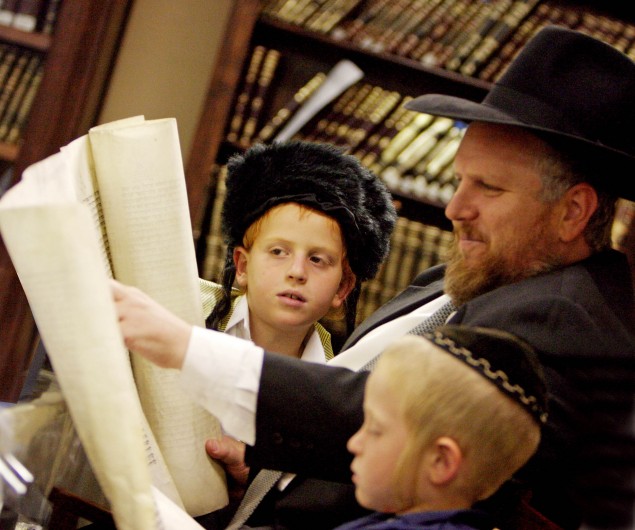
Rabbi Dov Tanzer, rosh yeshivah of Yeshiva College in Glenhazel, Johannesburg, reads the Megillah to his children on Purim.
In Johannesburg, the country’s largest city, about 15 to 20 percent of the Jewish community is Torah observant.
David Saks, associate director of South Africa’s Board of Jewish Deputies, the central organization of the country’s Jewish community, estimates that 80 percent of South Africa’s Orthodox community has ba’al teshuvah roots. “The proportion is dropping,” he said over lunch in one of Johannesburg’s many kosher restaurants, “because the kids are growing up frum from birth.”
Being a ba’al teshuvah, Saks said, has “become quite fashionable.”
One indicator, he said, is the growth of small synagogues favored by the newly religious. “Shtiebels are all over the place.”
After a decade of black-rule passed and fears of anti-white retribution dissipated, Jewish emigration and the size of the Jewish community has stabilized during the first years of this century. “Nobody is running,” Saks said.
While South African Jews started emigrating in the 1980s because of an already high crime rate and discomfort with the apartheid system, a smaller percentage of Orthodox Jews left, Saks said. With security concerns leveling off after a decade of black-rule passed and fears of anti-white retribution dissipated, Jewish emigration and the size of the Jewish community has stabilized during the first years of this century. “Nobody is running,” he said.
While the majority of Jewish South Africans are not shomrei mitzvot, as in any Western country, many are nominally Orthodox, members of Orthodox synagogues, and respectful of Orthodox belief and practice.
Most South African Jews, descendants of the largely dati immigrants who came from Lithuania starting in the late nineteenth century, have “a nascent respect for Jewish tradition,” Saks said. Because most are at least nominally Orthodox, there is less incentive for the frum community “to put up barriers,” according to Saks.
Signs of a vibrant Jewish life are everywhere:
• Day schools are flourishing. While many families are not Orthodox, they send their children to a day school, members of the community told me, because of the quality of education and safety concerns in other schools.
• Yeshivot and kollelim have mushroomed, particularly in Johannesburg but also in Cape Town and Pretoria.
• The number of lulav and etrog sets bought here for Sukkot has risen from 150 to some 4,000 over the last two decades.

Johannesburg boasts two dozen kosher restaurants, from modest pizzerias to restaurants catering to a professional crowd. Kosher-World supermarket is situated in the heart of the Jewish community in Glenhazel, a suburb of Johannesburg.
One Beit Din, One Shechitah
The community in recent decades has grown self-sufficient. “We used to import our rabbis,” Saks said. “Now we provide them ourselves. We basically can supply [all the community’s religious requirements] ourselves.”
Cape Town, which has a Jewish population of only 14,000 to 16,000, supports three kosher restaurants and three supermarket-based kosher delis. Johannesburg, with a larger Jewish population, has two dozen kosher restaurants, from modest pizzerias to tony places serving a professional crowd.
Thousands of packaged items bearing the South African Beit Din’s diamond-shaped hechsher are available in any store.
The country’s single Orthodox umbrella organization, the Union of Orthodox Synagogues of South Africa, maintains a single South African kosher-certifying agency, the Beit Din. “One beit din, one shechitah” —and less politics, says Chief Rabbi Warren Goldstein, who took office eight years ago when he was thirty-two years old. The country’s first South African-born chief rabbi, Rabbi Goldstein is a product of South Africa’s day school and yeshivah system.
“We are the establishment,” says Rabbi Goldstein, who speaks for South African Jewry on matters theological (representing the Jewish community in interfaith activities with Christian and Muslim clergy), political (delivering a eulogy at the funeral of apartheid opponent Helen Suzman, and speaking out when Archbishop Desmond Tutu made controversial anti-Israel comments last year), and sociological (encouraging South African Jews to donate toys and clothing and other items at a Johannesburg synagogue for impoverished blacks on Mandela Day, the celebration of the former president’s birthday, each year).
The rabbi, who also has a law degree, is the author of African Soul Talk: When Politics is Not Enough, an exchange of letters on the country’s spiritual crisis he conducted with Dumani Mandela, Nelson Mandela’s grandson.

Thousands of packaged items bearing the South African Beit Din’s diamond-shaped hechsher are available. Courtesy of the Union of Orthodox Synagogues of South Africa
A wide range of Jewish institutions, including Orthodox schools and shuls, are involved in the national effort to strengthen the Rainbow Nation. The institutions both sponsor humanitarian programs and provide volunteers.
“This is the South African ethos of unity,” Rabbi Goldstein said. “We’re engaged with the broader community.”
“Although [the Jewish community is] a small community,” Saks said, “it contributes out of proportion to its numbers.”
A Rabbi Who’s a Crime Fighter
The most prominent example of Jews helping to rebuild the post-apartheid society is MaAfrika Tikkun, a humanitarian group co-founded in 1994 by the late Rabbi Cyril Harris, the British-born chief rabbi who preceded Rabbi Goldstein. MaAfrika Tikkun (Repair from Africa) sponsors a variety of community health care and social relief programs, and educational and disaster relief services in several black townships.
“Judaism has never restricted its confines to the Jewish people only, but has always sought a wider, more universal role,” Rabbi Harris wrote in the organization’s mission statement. “A reading of the Jewish religious sources strongly indicates that non-involvement is not a Jewish option, that in the South Africa of today we are under a definitive moral obligation to contribute our Jewish talents and expertise for the benefit of the population at large.”
The latest example of atypical Jewish involvement in the wider society is the Community Active Protection (CAP) anti-crime project that Rabbi Goldstein helped found in Johannesburg in 2006. Under the innovative project, CAP volunteers and paid staff patrol an area of Johannesburg where 150,000 people live, many of them Jewish, many of them potential targets of crime.
CAP, Rabbi Goldstein said in a speech last year, created a new paradigm for space security and has brought down contact crime between 80 and 90 percent in its area of operation.
The streets and homes of the CAP-patrolled area are safer now. Residents of the area told me they feel safer.
The crime rate in Johannesburg, Rabbi Goldstein told me, is not going down—except in the CAP area. “This has transformed the lives of people in the area,” he said.
“How does a rabbi get into crime fighting?” the rabbi asked rhetorically in his speech.
“The answer is simple and brutal: it is a moral issue,” he answered. “It is about the most sacred values in Judaism, such as saving lives and protecting people from harm, injury and trauma. The fight against crime is one of the main human rights struggles of the new South Africa.”
“Surveys demonstrate and our personal experience shows how crime causes people to emigrate and become embittered about the future here. That is why CAP is so important to our future as a community and as a country.”
The Jews who are still in South Africa are probably staying, member after member of the community told me. They are committed to building the Jewish community and rebuilding the wider society.
While I was there, the Jewish Report, a local paper, carried an article on the latest sign of South African Jewry’s growth and of its faith in the future—the Cape Town Jewish community completed construction of its first eruv.
The builders of Cape Town’s eruv had learned from the lessons of the recent Johannesburg experience. This time there were no complaints that the eruv was endangering security.
Steve Lipman is a staff writer for the Jewish Week in New York.
To read an interview with Rabbi Warren Goldstein, visit http://jewishaction.oudev.org/11/2013/conversing-chief-rabbi-dr-warren-goldstein/.
